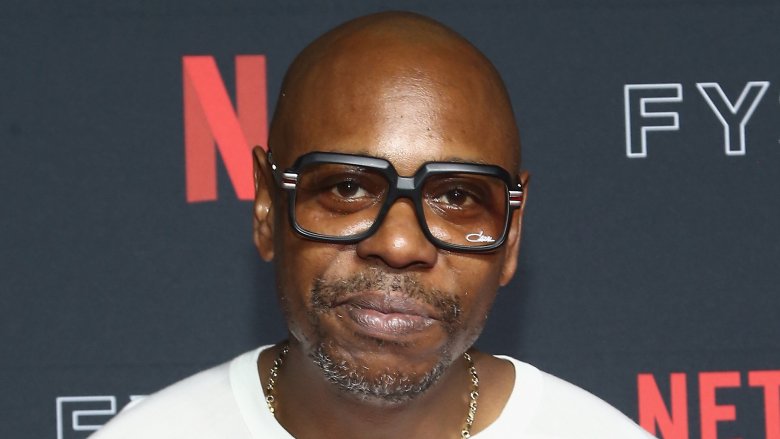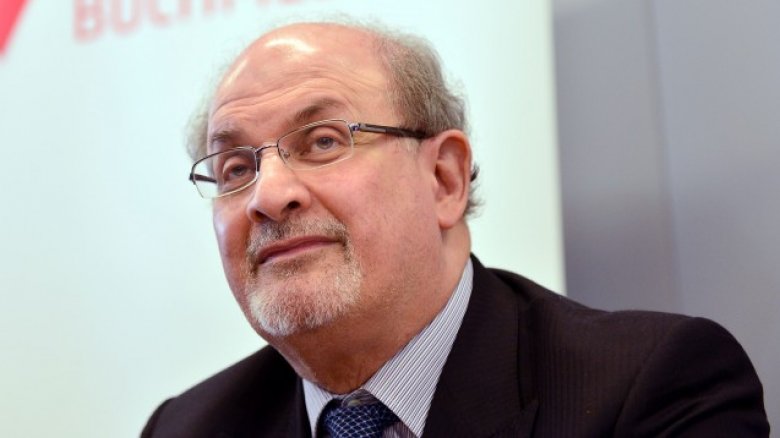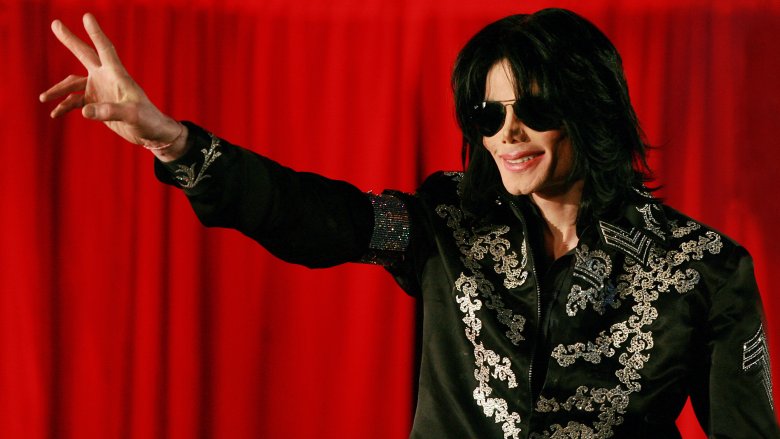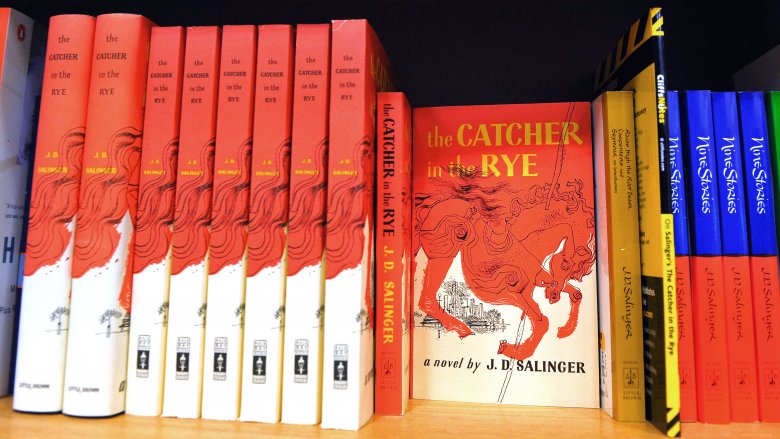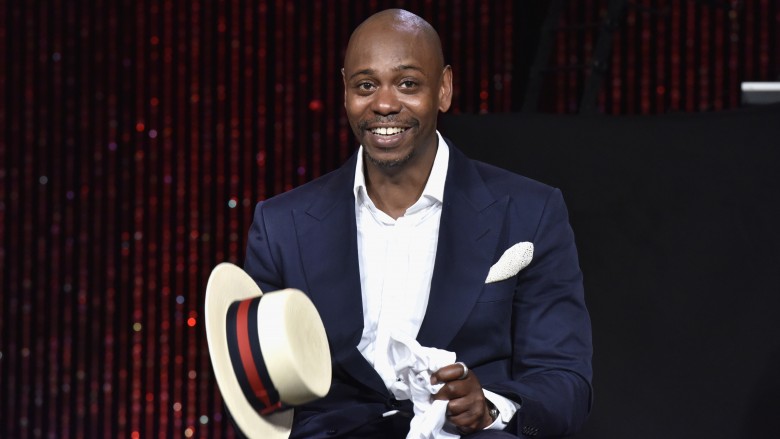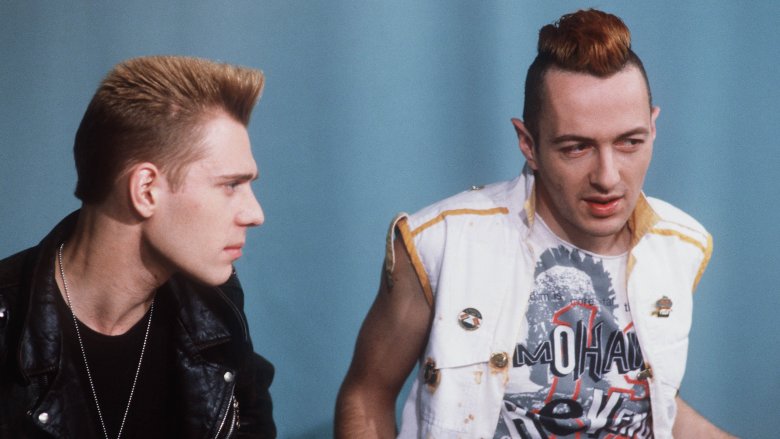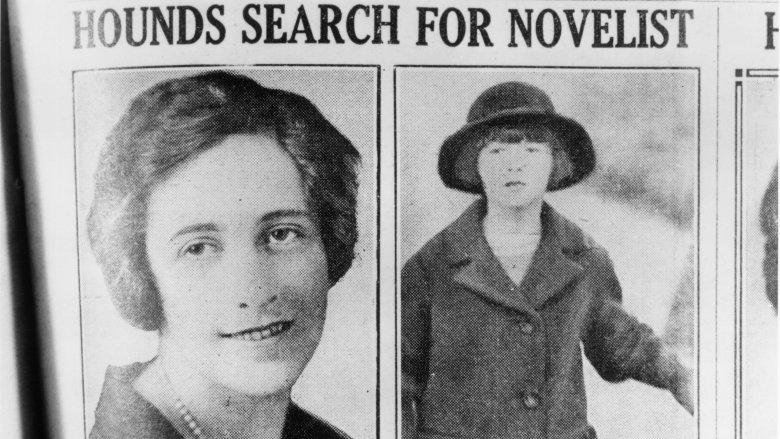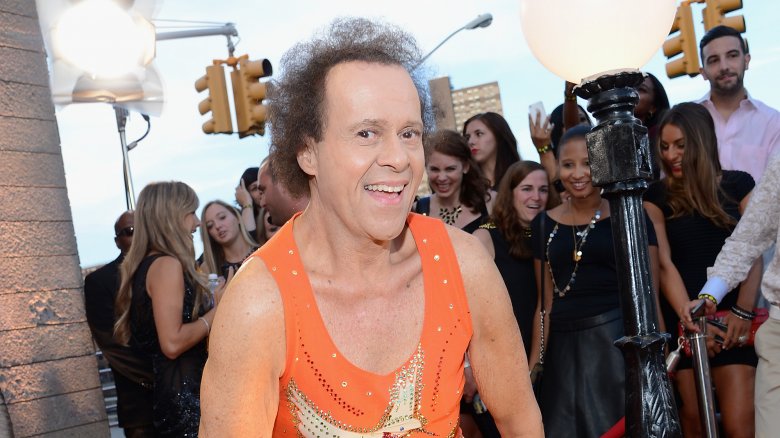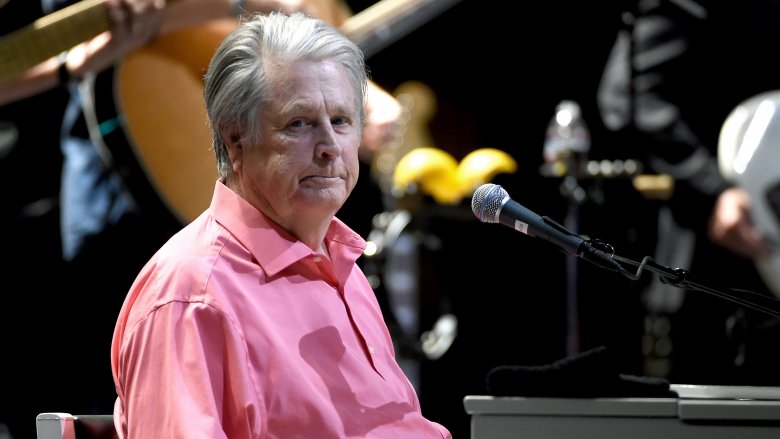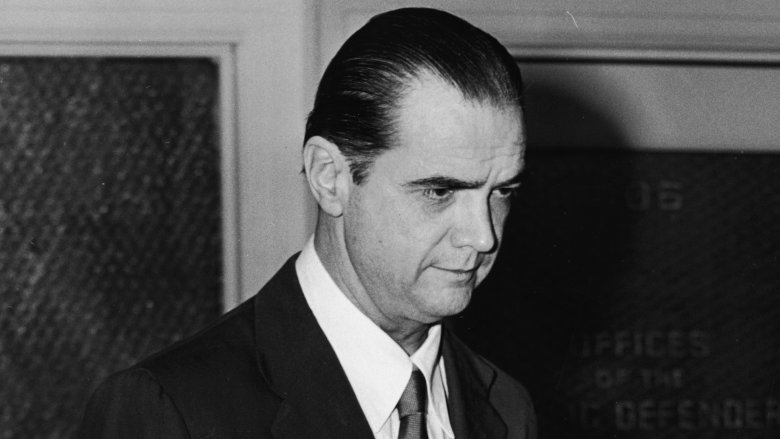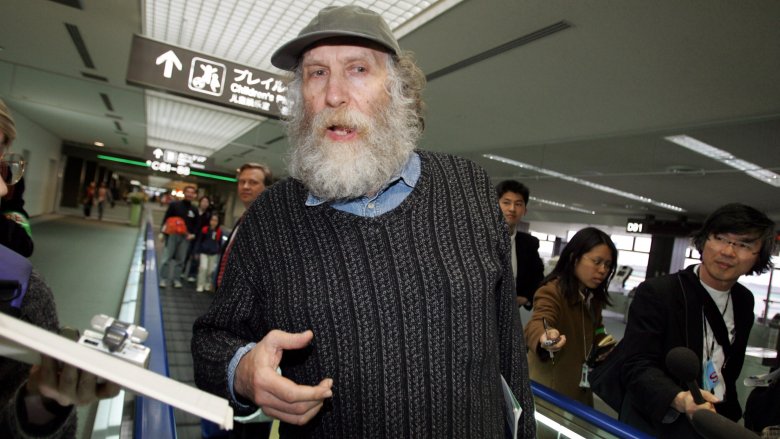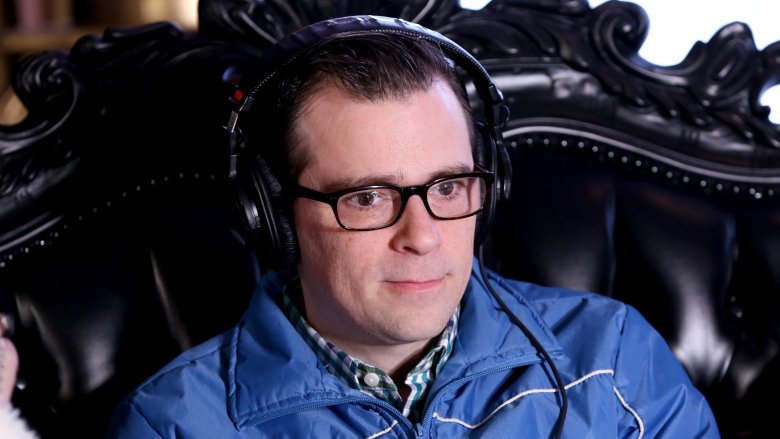Celebrities Who Went Into Hiding
It turns out that fame and fortune isn't all it's cracked up to be, and for some people, it's way more than they bargained for — like Dave Chappelle, who bailed on one of the most popular comedy series of all time. Of course, every star who turns their back on the public eye for the privacy of hiding has their own personal reasons for doing it, and while some celebs simply want a bit of their private lives back, others do it to save their lives.
Whether we're talking about Grammy-winner Jennifer Hudson dealing with the grief from a terrible tragedy, novelist Salman Rushdie literally running for his life, Michael Jackson just being Michael Jackson, or first lady Melania Trump recuperating from a medical procedure and spinning the internet into a conspiratorial frenzy, the vanishing acts pulled by these famous faces were no accidents. Here are the celebrities who went into hiding.
That she bounced back at all is a miracle
It wasn't until nearly two years after the tragic murder of her mother, brother, and nephew that Jennifer Hudson spoke about just how the horrific events of Oct. 24, 2008 affected her. When she was featured on VH1's Behind the Music: Jennifer Hudson (via E! News), she spoke candidly about her disappearance from the public eye following the murders.
"For almost two weeks straight ... [I was] inside one room with just family and friends coming in and out," she said. "...because of course the press was everywhere." It's understandable as to just why she wouldn't want to speak with anyone. She recounts relying heavily on her faith to help her face each morning. She was offered a film role during her seclusion, but turned it down. "I have to get adjusted to who I am now. So I can't be another character if I don't know who I am."
When she emerged, she did so in a very public way, performing the Star-Spangled Banner to open the 2009 Super Bowl. From there, it was on to the Grammys. She said lost loved ones were never far from her mind.
When the tabloid frenzy reaches a... Boyle-ing point
From the moment she started to sing on Britain's Got Talent in 2009, Susan Boyle was a worldwide success. The volunteer church worker was catapulted into the spotlight overnight, and according to friends, family, and show judges, she didn't know how to handle all the accolades and all the criticism.
According to People, Boyle was moved from her hotel to another, undisclosed location to allow her to prepare for the show undisturbed. Her brother, John, told People, "She has had people banging on her door. It has been really terrible for her." Empathy even arrived from an unlikely source — show judge Piers Morgan. Morgan told BBC Radio, "She is very distraught, to the extent where she packed her bags and was going to leave the show. She just didn't see the point of continuing if every time she picked up the newspapers there was another avalanche of abuse."
The extent of the massive media storm that Boyle found herself at the heart of garnered the attention of a psychologist who had formerly worked on another British television show, Big Brother. Professor David Wilson said that if Boyle had been taking part in a university experiment, it would be stopped. "It's a duty of care, it's about a moral responsibility," he said.
Boyle continued to perform and ultimately lost to a dance troupe.
Salman Rushdie hid to survive
In 1989, Ayatollah Khomeini issued a fatwa (ruling) against Salman Rushdie for writing and publishing The Satanic Verses. The book is based on an Islamic legend that says when the Prophet Muhammad was writing down the word of God, Satan tricks him into including some of his own verses. The story follows two men — Gibreel Farishta and Saladin Chamcha — who are held captive by terrorists and dream religious dreams.
Charging that the novel was nothing less than blasphemous, the Ayatollah ordered Rushdie's death and the deaths of his publishers, too. The danger was very, very real, and The Independent reported that the novel's Japanese translator was stabbed and killed, the Italian translator was stabbed but survived, and the Norwegian publisher was shot in the back three times outside his home. Rushdie went into hiding, and when he spoke with Spiegel Online in 2012, he talked a bit about the lengths he was forced to go to survive.
He assumed the name Joseph Anton — a combination of Joseph Conrad and Anton Chekov — and for 10 years, that was his identity. The Special Branch of the London Police escorted him through a series of apartments, motels, and hotels in what was dubbed Operation Malachite, and for a decade, he never went anywhere without two bodyguards, two drivers, and two armored cars. At first, he says it was only supposed to be a temporary measure. "But nothing resolved," Rushdie said. "Later on, there were incidents that made the threat palpable. A man in a cheap hotel in Paddington blew himself up while attempting to assemble a bomb. It turned out that it was meant for me."
Rushdie eventually came out of hiding, but the fatwa was reissued in February 2016.
Michael Jackson was looking for an oasis
Michael Jackson's downfall shocked the world, and after his death in 2009, one of his oldest friends talked about their last conversation and their last phone call. Donny Osmond and Michael Jackson stayed in touch over the years, after meeting as child stars from famous families, growing up under the hand of strict disciplinarians, and even writing songs dedicated to each other.
According to the Las Vegas Review-Journal, Jackson called Osmond about 18 months before he died. When asked where he was, Jackson admitted he had taken his kids, rented a motor home, and was hiding out in the desert of the American Southwest. According to Osmond, Jackson told him, "I just want to hide. I want to get away from people." Osmond says he had offered Jackson safe haven in his Utah home, and while the controversial pop star had said he was going to take Osmond up on the offer, he never did.
"He shut it down after that," the Review-Journal quoted Osmond as saying. "He isolated himself after that. His life was in shambles."
The original one-hit wonder
Everyone who's gone through high school since The Catcher in the Rye was published has read JD Salinger's coming-of-age tale, but while Salinger's work is undeniably famous, the writer himself was so elusive it seems impossible to believe that he only died in 2010, at 91 years old.
In 2013, Shane Salerno and David Shields published Salinger, a book that examined the novelist's reclusive life and uncovered some heartbreaking stories. One of the things Salinger never spoke about was his time serving in World War II. He was reportedly carrying six chapters of his famous novel with him when he landed on the beach on D-Day. Afterward, he checked into a mental institution to help him deal with what he'd seen. "...and then he did something truly remarkable, which is, came out of the mental institution and signed back up for more, and participated in the de-Nazification of Germany," Salerno said, suggesting in an interview with CBS News that the effects of the war both made the writer and broke the man, driving him toward a life of isolation.
And yet, there was a time when the book seemed doomed. In an interview with NPR, Salerno talked about how Salinger was turned down by a publisher who deemed Holden Caulfield too insane to publish. "Being told that he was crazy and that Holden Caulfield was crazy was a great wound to him," Salerno said. "In fact, he teared up in the room and was deeply, deeply hurt."
Regrouping in Africa
In 2005, Dave Chappelle was riding a wave of fame fueled by his hugely successful television show. That's when he seemed to drop off the face of the Earth. He suddenly disappeared from Comedy Central, forcing the network to cancel Chappelle's Show. He spent some time in South Africa but didn't talk much about what prompted his escape. According to the Los Angeles Times, he'd cut off communication with friends, family, and professional contacts, too.
Chappelle emerged from hiding slowly, first with a few appearances in low-key comedy clubs and then with a stand-up act in 2013, reported Maxim. When he talked to David Letterman in 2014 (via Vanity Fair), he said that he simply needed a bit of a reboot. He retreating to South Africa was to get out of the public eye and away from the press and to spend more time with his family. "There's nothing anyone can say," Chappelle said. "It's just you do what you feel like you need to do. ... there are other things in my life that I do not purchase with money that are very valuable."
Joe Strummer's Parisian interlude
Joe Strummer (pictured right) might not be a household name anymore, but his music still is. The punk rock icon and front man for The Clash died in 2002 of sudden cardiac arrest not long after a UK tour. Back in 1982, when the band began to struggle, Strummer proved he didn't just play rock, he lived it.
Ticket sales for The Clash were reportedly slumping, so manager Bernie Rhodes supposedly suggested Strummer drop out of the public eye for a bit to drum up some publicity. The official plan was apparently for Strummer to lay low in Texas for a bit, but the rocker had other ideas. Before he could be shipped off to the Lone Star State, Strummer truly disappeared. For three weeks, not only did the public not know where he was, but his friends, family, and manager didn't know, either.
According to The Current, they finally found him living on the Paris streets. While he was there, he reportedly ran the Paris Marathon following a self-described training routine of 10 pints of brew a night. Strummer later said the entire thing was a mistake that did nothing to halt the decay of the band. The Clash fell apart not long after.
Agatha Christie's greatest mystery was her own hiatus from fame
Agatha Christie (pictured left) is synonymous with murder and mayhem, and she holds no less than three records in the Guinness Book of World Records — for the thickest book, with the 4,000+ page The Complete Miss Marple; for the world's best selling author; and for the world's longest-running play, The Mousetrap.
But in 1926, something happened to Christie, and no one's entirely sure what. On December 3, she kissed her sleeping 7-year-old daughter goodbye, got into her car, and drove off. The car was found abandoned nearby, but there was no sign of Christie — in spite of the fact that more than 1,000 law enforcement officials, hundreds of civilians, and two other crime writers (Sir Arthur Conan Doyle and Dorothy L. Sayers) were called in to look for her. Theories ranged from murder to a publicity stunt, and it wasn't until 11 days later that she was found at a spa and hotel in Harrogate. She had checked in using the name Theresa Neele, which wasn't entirely random — it was the name of her husband's mistress.
When she was finally recognized, her husband was called to collect her. According to History Extra, she wasn't distressed in the least, and even made him wait while she changed her clothes before heading home. She never spoke or wrote of what happened, but biographers now think she had entered a sort of fugue state triggered by extreme depression, perhaps prompted by her husband's reportedly relentless cheating. She divorced him in 1928.
Can a guy just take a break?
In December 2014, TMZ reported that Richard Simmons hadn't been seen by his friends in nearly a year. The revelation of the fitness guru's public disappearance led to all sorts of speculation, ranging from the tragic to the absurd. Allegations of elder abuse prompted Los Angeles police to perform a "welfare check" on Simmons in January 2015. He was fine.
The speculation swirled on. The National Enquirer even errantly reported that Simmons went into hiding while he transitioned into a woman, a claim that ultimately triggered a failed lawsuit by the former Sweatin' to the Oldies instructor. Simmons tried to quell the madness by phoning into Today in March 2016, telling the morning show, "No one is holding me in my house as a hostage. ... I just sort of wanted to be a little bit of a loner for a little while."
By March 2017, Simmons still hadn't made a public appearance, and the fervor surrounding his then-3-year disappearance reached a fever pitch. A podcast investigating his absence even hit No. 1 on the iTunes chart. Around this time, Simmons was hospitalized for "gastrointestinal issues," which prompted a fresh round of concern and another response from Simmons via his official Facebook page. As of this writing, Simmons has yet to make a public appearance, despite promises of a new product line that may or may not require him to once again step into the spotlight.
That time FLOTUS fled the scene
After a surprise announcement from the White House that she underwent a kidney procedure, first lady Melania Trump disappeared from the public eye for 25 days. The internet went wild with speculation, according to Marie Claire, which compiled some of the crazier conspiracy theories surrounding #WhereIsMelaniaTrump. Plastic surgery, marital strife, and even claims of clones and body doubles all made the list of kooky internet conjecture. Even a tweet from Melania's official Twitter account, assuring everyone that she was "here at the @WhiteHouse w my family, feeling great," did little to stop the rumor mill.
The frenzy over FLOTUS' vanishing act wasn't unfounded. According to The New York Times, who spoke with Katherine Jellison, an Ohio University professor who studies first ladies, Melania's absence was "unprecedented." She eventually returned to public life on June 4, 2018 by attending a reception for Gold Star Families of service members killed in Iraq. Melania and her staff have not elaborated, "citing the privacy laws to which Mrs. Trump, like any other patient, is entitled."
We'll probably never know what Melania was up, but we do know that soon after she emerged, she sparked a new round of controversy when she wore her now infamous "I really don't care. Do u?" jacket on her way to visit detained immigrant children. Seems like someone could use another break already.
Madness behind the music
Considered the creative genius behind The Beach Boys, singer/songwriter Brian Wilson was the author of the majority of the group's smash hits, including "God Only Knows," "Good Vibrations," "Little Deuce Coupe," and so many more, but after achieving mainstream success in the early '60s, Wilson yearned for deeper creative fulfillment.
According to the Independent, Wilson went to work on his opus of musical enlightenment, an album called Smile, which he attempted to conceive through experimentation with LSD. Unfortunately, the psychedelic drug only exacerbated his then-undiagnosed "schizoid-affective disorder." Smile went unfinished, and Wilson's entire music career faded as he "spent the next three decades in chaotic reclusion."
A Biography profile painted a dismal picture of this period in Wilson's life, describing him as "derailed by drug abuse," and having "spent his days in his California mansion slumped in bed — overeating, drinking, using drugs, and watching television." He gained a bunch of weight, eschewed personal hygiene, and rarely stepped out in public. When he did, he was observed "at Los Angeles clubs in a bathrobe and slippers, clearly in an altered state of mind."
After an intense period of recovery, the former Beach Boy finally performed live again in 1999. He even released Smile in 2004, to the delight of fans and critics. According to Pitchfork contributor Dominique Leone, the album "delivers, and despite his age, Wilson's voice even sounds fantastic, still carrying the weight of these angelic melodies."
A billionaire maverick with dark demons
Billionaire Howard Hughes was one of the 20th century's most notable figures. He traded in controversy and pushed the limits in every area he explored, from the world of aviation to filmmaking. He was also allegedly plagued by significant demons, the details of which are still shrouded in mystery.
A Men's Journal profile of Hughes claims his notorious germophobia came from "a case of syphilis he'd contracted in the late '30s." The obsessive-compulsive disorder then "intensified" in 1946, following a nearly fatal plane crash, according to Time. While recuperating, Hughes reportedly confined himself to the screening room of his mansion for four months, "doing little more than eating chocolate bars, drinking milk and relieving himself into empty bottles."
By the late 1960s, according to Biography, Hughes had holed up in the penthouse of the Desert Inn in Las Vegas, using the posh spot as both his living and business headquarters, although he was rarely ever seen. According to the Las Vegas Sun, Hughes left the inn abruptly — on a stretcher in an unmarked van — and fled to the Bahamas. He died six years later aboard a flight from Mexico to Houston.
Bobby Fischer ran out of moves
Chess prodigy Bobby Fischer achieved legendary status in 1972 after defeating Russian champ, Boris Spassky, and becoming the first American chess world champion, according to The New York Times. Then he disappeared for 20 years, living anonymously in California, rumored to be "linked with a fundamentalist sect called the Worldwide Church of God."
When Fischer returned to public view on the 20th anniversary of his epic win over Spassky, it wasn't so great. He held a press conference in which he expressed anti-semitic views, accused other chess players of cheating, and spat at a U.S. Treasury order instructing him not to take place in a chess match held in Yugoslavia. From this point forward, Fischer's bizarre behavior only intensified. He popped back into the spotlight only to do things such as "praise the September 11 attacks" and get detained in Japan for eight months after traveling there "on a revoked US passport," according to ABC.
Fischer died while living as a fugitive (wanted for that aforementioned Yugoslavia match) in Iceland in 2008. According to The Telegraph, his funeral was a fittingly secretive affair. His grave was reportedly dug in the middle of the night, without permission from the churchyard minister. Only five mourners supposedly attended the unsanctioned, early-morning service, and even their identities remain a mystery to this day.
Weezer's frontman is an eccentric dude
Rivers Cuomo, the eccentric Weezer frontman and unwitting tastemaker who is almost singularly responsible for an entire hipster generation's preference in glasses, also happens to be a famous recluse. In a 2005 Rolling Stone profile, Cuomo said it all started with a "Tibetan-Buddhist meditation retreat," which he found to be too tame for his burgeoning monastic ways.
"I knew I wanted something extreme," he told the rock mag. That pursuit of solitude eventually gave way to repeated trips into seclusion, including one 20-day stint in Northern Massachusetts, which he "spent in a closet." Though this occasionally hermetic lifestyle seems relatively harmless, there may be a dark kernel to it all.
Rolling Stone also reported that after the relatively dismal reception of Weezer's sophomore album, Pinkerton, Cuomo retreated into a decidedly less healthy version of solitude. He apparently kept to his L.A. apartment, where he "put fiberglass insulation over the windows and hung black sheets over the insulation" and "painted all the walls black, disconnected his phone and spent a lot of time with his pet gecko."
Fast-forward 12 years and Cuomo, now married with kids, still seems to be searching for meaning. "It's like, there's got to be something more to life than just the grind of touring and performing and doing interviews," he told Vulture in 2017.
Maybe the gecko's still available for a pep talk?

